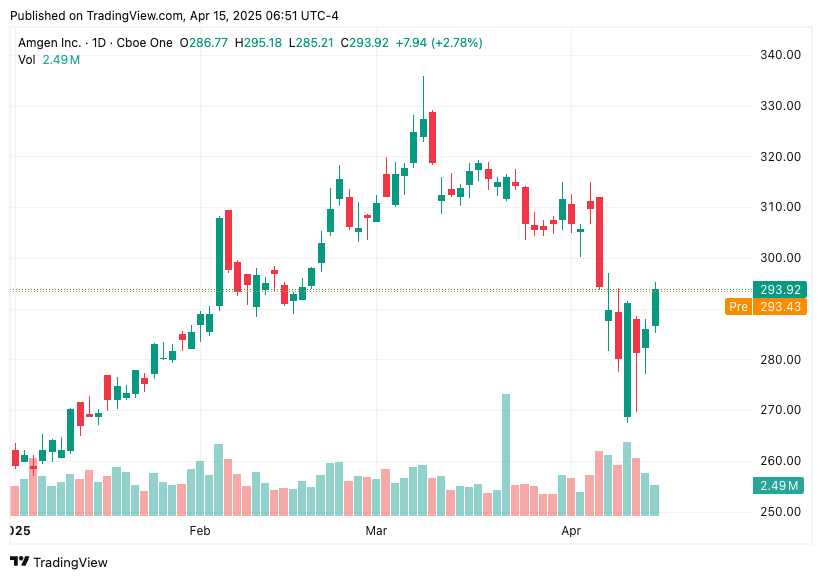Amgen’s Game-Changing Bet: Could This Monthly Injection Make Obesity History?
Why Amgen’s MariTide May Become the Blockbuster Drug Investors Have Been Waiting For
If you're looking for a company that's about to shake up an industry and potentially your investment portfolio—well, you might want to keep reading. Amgen Inc. (NASDAQ: AMGN), best known for dominating fields like oncology and autoimmune diseases, has decided it's ready for a bold new move: entering the sizzling-hot obesity drug market. And they’re doing it with swagger.
How? Meet MariTide (maridebart cafraglutide), a once-monthly injectable that's turning heads and raising eyebrows on Wall Street and beyond. Think of it this way: competitors like Novo Nordisk’s Wegovy and Eli Lilly’s Zepbound require weekly injections. MariTide? Once a month. It’s like comparing a weekly chore list to a monthly Netflix subscription—significantly less hassle, more compliance, and happier patients.
Why MariTide Is Generating Buzz
Here’s the scoop. MariTide just wrapped up its Phase 2 trials, and the results are undeniably impressive. Over 52 weeks, patients without Type 2 diabetes lost an eye-catching 20% of their body weight. Even patients with diabetes saw weight reductions of up to 17%. More intriguingly, unlike most weight-loss therapies that plateau, MariTide kept delivering consistent, sustained results over time.
To put this into perspective: these numbers place MariTide in the heavyweight class, ready to go toe-to-toe with market darlings like Wegovy and Zepbound. The market took notice, though with mixed reactions—more on that shortly.
Wall Street’s Double Take
Amgen’s initial announcement of Phase 2 results led to a knee-jerk drop in stock price. Why? Investors were jittery about some side effects and dropout rates during trials, a normal hiccup in drug development but enough to create temporary panic. This was Wall Street doing what it does best: overreacting.
Jefferies analysts, among others, quickly called foul, labeling the dip as classic investor short-sightedness. The fundamentals? Still rock solid. Amgen quickly doubled down, pushing MariTide into Phase 3 trials. The message was clear: the company is all-in on making MariTide a cornerstone product.
2025 So Far: Steady Gains Amid Turbulence
Let’s get tactical. As of April 14, 2025, Amgen’s stock has not just survived—it’s thrived, delivering a healthy 12.77% year-to-date return. That’s resilience in action, a testament to investor confidence in Amgen’s vision and ability to execute.
Sure, biotech is notoriously volatile. Yet Amgen’s proven track record in successfully bringing biologics from the lab bench to blockbuster status provides the kind of confidence that keeps institutional investors nodding in approval. MariTide might just be the next chapter in that impressive narrative.
Scaling Up: The Billion-Dollar Bet
Amgen isn’t just talking big—they’re investing big. To meet the expected high demand for MariTide (assuming FDA approval is granted), the company is funneling a cool $1.02 billion into expanding its manufacturing facility in Holly Springs, North Carolina.
This isn’t just spending; it’s strategic muscle-flexing. Amgen knows that supply chain hiccups have plagued competitors like Novo Nordisk, who faced shortages and investor backlash. Amgen is proactively removing these potential bottlenecks. It’s like watching a chess grandmaster set the stage several moves ahead.
The Obesity Gold Rush
Let’s zoom out and appreciate the macro picture. Obesity treatment isn't a niche market—it’s a potential $150 billion colossus waiting to be conquered by early movers and innovators. Obesity is no longer just a public health crisis; it’s become a compelling investment narrative.
Wall Street, venture capitalists, and Big Pharma are scrambling for positioning. Amgen, a seasoned heavyweight in biologics, enters the arena with perfect timing, an innovative product, and deep pockets. MariTide could become the ultimate obesity-drug disruptor—especially if it can capture market share from existing giants.
Risks? Of Course—But They’re Calculated
To keep things balanced, it’s worth mentioning that regulatory approval is never guaranteed. Obesity drugs have historically been tough to navigate through the FDA’s rigorous safety gauntlet. MariTide’s Phase 3 data will be scrutinized for side effects, sustainability of weight loss, and long-term safety. Amgen knows the stakes, and this isn’t their first rodeo.
In short, risks exist—but so does enormous potential upside. High reward rarely comes without some calculated risk-taking. This is precisely what makes the Amgen narrative so compelling.
Final Takeaway: The Opportunity in Front of Investors
Amgen’s pivot toward obesity treatments isn’t just another corporate side project—it’s a strategic leap into one of healthcare’s most lucrative and rapidly growing markets. With MariTide’s standout dosing convenience and impressive early clinical results, the company isn’t just dipping its toes—it’s cannonballing into the deep end.
Amgen’s move is bold, but that boldness may pay off dramatically for investors who recognize the opportunity before the broader market does. If MariTide hits big, today's Amgen share prices might soon look like bargain prices in hindsight.
Could MariTide be the new champion in the obesity drug arena? Only time (and Phase 3 trials) will tell—but for investors who love innovation, disruption, and serious upside, Amgen just might be the story to follow.
Disclaimer: This post is for educational purposes and should not be taken as financial advice. Always do your own research or consult a qualified financial professional before making investment decisions.


